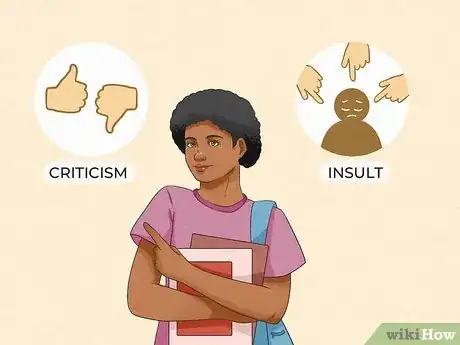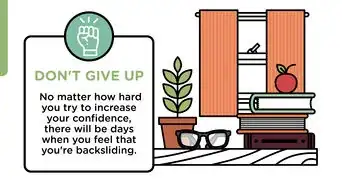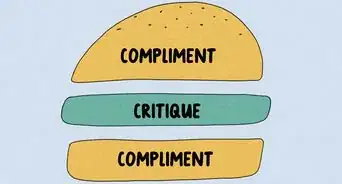This article was co-authored by Erin Conlon, PCC, JD. Erin Conlon is an Executive Life Coach, the Founder of Erin Conlon Coaching, and the host of the podcast "This is Not Advice." She specializes in aiding leaders and executives to thrive in their career and personal lives. In addition to her private coaching practice, she teaches and trains coaches and develops and revises training materials to be more diverse, equitable, and inclusive. She holds a BA in Communications and History and a JD from The University of Michigan. Erin is a Professional Certified Coach with The International Coaching Federation.
There are 9 references cited in this article, which can be found at the bottom of the page.
wikiHow marks an article as reader-approved once it receives enough positive feedback. This article has 13 testimonials from our readers, earning it our reader-approved status.
This article has been viewed 210,679 times.
Do you tend to overreact when someone says something hurtful? It's normal to feel a sting when someone criticizes or insults you. However, if you tend to lash out in anger, cry, or feel upset for days, you may want to focus on developing a thicker skin. While there's nothing wrong with being sensitive, it's no fun to get knocked off balance by a casual comment. By learning to look at the bigger picture, having a positive attitude and building confidence, you can stand strong the next time you feel insulted.
Things You Should Know
- When you receive a negative comment, take a moment to let the emotions wash over you before reacting. If it helps, silently count to 10.
- Separate criticism from insult. Remember that people who habitually insult others have low self-esteem or emotional baggage they need to deal with.
- Take context into account. Did the person mean well, or were they being cruel?
- Try to spend more time with people who support you and view you in a positive light, rather than people who refuse to accept you.
Steps
Expert Q&A
Did you know you can get expert answers for this article?
Unlock expert answers by supporting wikiHow
-
QuestionHow do you respond to negative criticism?
 Erin Conlon, PCC, JDErin Conlon is an Executive Life Coach, the Founder of Erin Conlon Coaching, and the host of the podcast "This is Not Advice." She specializes in aiding leaders and executives to thrive in their career and personal lives. In addition to her private coaching practice, she teaches and trains coaches and develops and revises training materials to be more diverse, equitable, and inclusive. She holds a BA in Communications and History and a JD from The University of Michigan. Erin is a Professional Certified Coach with The International Coaching Federation.
Erin Conlon, PCC, JDErin Conlon is an Executive Life Coach, the Founder of Erin Conlon Coaching, and the host of the podcast "This is Not Advice." She specializes in aiding leaders and executives to thrive in their career and personal lives. In addition to her private coaching practice, she teaches and trains coaches and develops and revises training materials to be more diverse, equitable, and inclusive. She holds a BA in Communications and History and a JD from The University of Michigan. Erin is a Professional Certified Coach with The International Coaching Federation.
Executive Life Coach Think about what exactly you are responding to. If you usually hear a critique and think something like "I'm a failure", you'll never grow. It may not come from somebody you like. It may not be the better way to give you feedback, but there's usually a little bit of wisdom to be obtained from the negative criticism. So, train yourself to hear and respond accordingly to create truthful and honest relationships with people around you.
Think about what exactly you are responding to. If you usually hear a critique and think something like "I'm a failure", you'll never grow. It may not come from somebody you like. It may not be the better way to give you feedback, but there's usually a little bit of wisdom to be obtained from the negative criticism. So, train yourself to hear and respond accordingly to create truthful and honest relationships with people around you. -
QuestionHow can I avoid caring that coworkers don't like me?
 Paul Chernyak, LPCPaul Chernyak is a Licensed Professional Counselor in Chicago. He graduated from the American School of Professional Psychology in 2011.
Paul Chernyak, LPCPaul Chernyak is a Licensed Professional Counselor in Chicago. He graduated from the American School of Professional Psychology in 2011.
Licensed Professional Counselor
-
QuestionI tend to get very emotional about little things at work, such as when I have forgotten to do something. However, it is not an issue for me if others do the same. How can I deal better?
 Paul Chernyak, LPCPaul Chernyak is a Licensed Professional Counselor in Chicago. He graduated from the American School of Professional Psychology in 2011.
Paul Chernyak, LPCPaul Chernyak is a Licensed Professional Counselor in Chicago. He graduated from the American School of Professional Psychology in 2011.
Licensed Professional Counselor
Warnings
- Do not think that having thick skin means being rude or indifferent.⧼thumbs_response⧽
- Not all people who criticize you, want to hurt your feelings. There is a difference between constructive criticism and plain rudeness.⧼thumbs_response⧽
References
- ↑ Erin Conlon, PCC, JD. Executive Life Coach. Expert Interview. 31 August 2021.
- ↑ https://www.psychologytoday.com/intl/blog/rediscovering-love/201105/speaking-you-think-foot-in-mouth-syndrome-in-committed-relationships
- ↑ Erin Conlon, PCC, JD. Executive Life Coach. Expert Interview. 31 August 2021.
- ↑ https://www.helpguide.org/harvard/benefits-of-mindfulness.htm
- ↑ https://www.psychologytoday.com/blog/hide-and-seek/201302/how-deal-insults-and-put-downs
- ↑ https://psychcentral.com/health/how-to-improve-your-life
- ↑ Erin Conlon, PCC, JD. Executive Life Coach. Expert Interview. 31 August 2021.
- ↑ Erin Conlon, PCC, JD. Executive Life Coach. Expert Interview. 31 August 2021.
- ↑ https://www.psychologytoday.com/blog/hide-and-seek/201302/how-deal-insults-and-put-downs
About This Article
If you want to develop a thick skin, start by learning to control how you react to negative comments. Take a moment to let the first wave of emotion wash over you, then wait for it to subside before doing or saying anything. It also helps to separate constructive criticism from insults. Criticism serves a positive function and you can learn from it, but insults are meant to cause pain and you don't have to take them to heart. Give yourself permission to reject insults instead of believing them! Keep in mind that people who insult others often do so because they have their own emotional baggage, like misplaced anger, personal issues, or personality flaws. For tips on developing a more positive mindset, read on!















































































